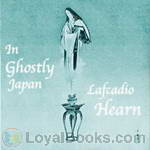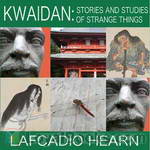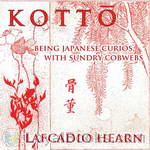|
Books Should Be Free Loyal Books Free Public Domain Audiobooks & eBook Downloads |
|
|
Books Should Be Free Loyal Books Free Public Domain Audiobooks & eBook Downloads |
|
Author Collection |
|---|
By: Lafcadio Hearn (1850-1904) | |
|---|---|
 In Ghostly Japan
In Ghostly Japan
This collection of 14 stories collected by Lafcadio Hearn, contains Japanese ghost stories, but also several non-fiction pieces. Hearn tries to give a glimpse into the customs of the Japanese, by giving examples of Buddhist Proverbs and explaining the use of incense and the nation wide fascination with poetry. Furthermore, he has again translated several hair-rising ghost stories, like "A Passional Karma" about the truly undying love of a young couple. | |
 Kwaidan: Stories and Studies of Strange Things
Kwaidan: Stories and Studies of Strange Things
Most of the following Kwaidan, or Weird Tales, have been taken from old Japanese books,— such as the Yaso-Kidan, Bukkyo-Hyakkwa-Zensho, Kokon-Chomonshu, Tama-Sudare, and Hyaku-Monogatari. Some of the stories may have had a Chinese origin: the very remarkable "Dream of Akinosuke," for example, is certainly from a Chinese source. But the story-teller, in every case, has so recolored and reshaped his borrowing as to naturalize it… One queer tale, "Yuki-Onna," was told me by a farmer of Chofu, Nishitama-gori, in Musashi province, as a legend of his native village... | |
 Kottō : being Japanese curios, with sundry cobwebs
Kottō : being Japanese curios, with sundry cobwebs
Kottō contains 20 Japanese stories, collected from different sources and translated by Lafcadio Hearn. The types of stories in this collection are widespread: There are old ghost stories Hearn is best known for (The Legend of Yurei-Daki), his own observations and musings (Pathological), as well as the translation of 'A Woman's Diary', a touching account of the life of the poorer classes in Tokyo, written at the end of the 19th century. | |
 Kokoro: Hints and Echoes of Japanese Inner Life
Kokoro: Hints and Echoes of Japanese Inner Life
In an introductory paragraph, Lafcadio Hearn declares his intention: "The papers composing this volume treat of the inner rather than of the outer life of Japan, for which reason they have been grouped under the title Kokoro (heart). Written with the above character, this word signifies also mind, in the emotional sense; spirit; courage; resolve; sentiment; affection; and inner meaning, just as we say in English, "the heart of things."" The result is a highly eclectic collection of stories, diary... | |
 Chita: a Memory of Last Island
Chita: a Memory of Last Island
| |
 The Romance of the Milky Way And Other Studies & Stories
The Romance of the Milky Way And Other Studies & Stories
| |
 Japan: An Attempt at Interpretation
Japan: An Attempt at Interpretation
Greece-born Lafcadio Hearn (1850 - 1904) spent decades of his life in Japan, even marrying a Japanese woman, thus becoming a Japanese citizen by the name of Koizumi Yakumo (小泉 八雲). He wrote many books on Japan, especially about its folklore. In this posthumously published book, he takes a closer look at Japan's religious history: How it developed from ancient beliefs into Shintoism, resisted suppression attempts by both Buddhism and Christianity and how – despite efforts to westernise Japan during the era known as Meiji Restoration – it remained the basis for Japanese society... | |
 Glimpses of Unfamiliar Japan Second Series
Glimpses of Unfamiliar Japan Second Series
| |
 Two Years in the French West Indies
Two Years in the French West Indies
| |
 Books and Habits, from the Lectures of Lafcadio Hearn
Books and Habits, from the Lectures of Lafcadio Hearn
| |
 Exotics and Retrospectives
Exotics and Retrospectives
Lafcadio Hearn, born 1850 in Greece, went to Japan when he was 40 years old and became a Japanese citizen only 6 years later. His writings about Japan from the beginning of the Meiji era, when the country was just opening to the West, remain among the most important explanations of Japanese culture. This book contains in the first part, "Exotics", his observations of and personal insights into Japan. For example, Fuji no Yama tells about him climbing the highest mountain in Japan; and A Question in the Zen Texts, Literature of the Dead, and Of Moon Desire try to explain Buddhist teachings... | |
 Gleanings in Buddha Fields
Gleanings in Buddha Fields
Lafcadio Hearn was one of the first Westerners to live in Japan during the early Meiji era, and a prolific writer. Although chiefly known for his collections of Japanese ghost stories , he also wrote many non-fiction essays about his life in Japan. This book contains 11 essays covering a variety of topics. For example, Hearn writes about his visits to Kyoto and Osaka, Japanese art, as well as Buddhism and Nirvana. Prooflisteners for this book were Isana and Margot. | |